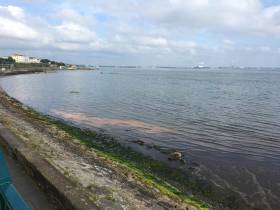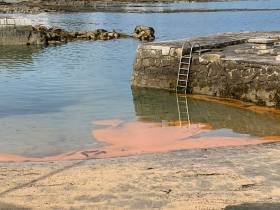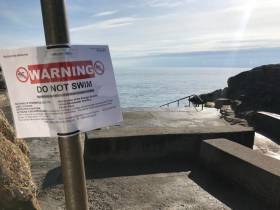Displaying items by tag: Bathing Ban
The Irish National Sailing & Powerboat School (INSS) has expressed its frustration over the second discharge this month of wastewater into Dublin Bay, which has seen new bathing bans issued at several popular swimming spots in the capital.
While the latest notice does not apply to the waters inside Dun Laoghaire Harbour, the INSS says it has still had to activate its ‘unclean water procedure’ as Salthill beach, from where it usually operates, and other locations woke up to an ‘orange slick’ on the shoreline this morning (Tuesday 25 June). This slick has since been confirmed by the local authority as an algal bloom "not directly associated" with the wastewater overflow.
The procedure involves alterations to activities, use of small keelboats instead of dinghies if appropriate, and stringent instructor supervision to ensure people are on rather than in the water.
While afloat, all safety boats must carry hand-sanitising wipes, and children must regularly wash their hands. Shore side, extensive hand-washing, sanitising gels and a focus on good hygiene practises minimises the risk as much as possible.
“On this occasion, we have been relatively lucky to still be able to operate within the harbour,” said Glyn Williams, the school’s communications and marketing manager.
“However, it’s not good enough that we find out about this later in the day,” he added, referring to the initial reports of the latest bathing ban last night. “The treatment plant operator knew they were discharging. Why not tell everyone straight away?”
Chief instructor Kenneth Rumball also noted that the summer sailing season for children is only 12 weeks long, and with the current water notices lasting until at least this Thursday “we now have six days of a short summer lost to this”.
Responding to Irish Water’s claim that the latest overflow ‘happened as it should have happened’, the school said this cuts little ice with the parents of children attending the its courses.
“Parents are equally as exasperated as we are. While all those we spoke with earlier this morning are understanding, they equally feel that Irish Water/the treatment plant operator should get this solved more quickly than they are currently doing.”
Following similar calls by the likes of Green Party Councillor Ossian Smyth, the INSS is urging those with responsibility to immediately progress upgrades for the sewage system at Ringsend Treatment Plant to cope with heavy rainfall — something Irish Water says would require a “huge amount” of investment.
The school also calls for more transparent communication, in real time, if and when discharges are occurring, coupled with pre-emptive warnings and same-day water sampling results.
Commenting on how these water quality issues affect the development of Dun Laoghaire Harbour as a marine leisure destination, Glyn Williams said: “We have to make sure that we get the basics in place before we undertake large scale plans.
“There’s no point in expending time and money when the most basic requirement for water sports is not in place: safe water to operate in.”
Updated: New Bathing Ban For Dublin Beaches After Heavy Rains Lead To Wastewater Overflow
Heavy rains in recent days have led to another wastewater overflow at the Ringsend treatment plant, as well as other pumping stations, that has prompted a new swimming ban at several Dublin Bay beaches.
It marks the second time this month that bathing has been prohibited at Dollymount Strand, Seapoint, Sandycove and the Forty Foot at Sandycove.
Both Dublin City and Dun Laoghaire-Rathdown councils say their bans will remain in place pending test for water quality, the first results of which are due on Thursday — in a week where Met Éireann forecasts higher temperatures.
While the bans do not affect Dun Laoghaire Harbour or other beaches in either council area, organisers of water-based sporting events have been advised to take note, as The Irish Times reports.
Notices will be put up on beaches today, Tuesday 25 June, according to RTÉ News.
Update 4.30pm: Dun Laoghaire-Rathdown County Council says tests on an ‘orange slick’ at Sandycove Beach confirm the presence of Noctiluca scintillans, a form of algae, and not raw sewage.
In a statement, the council said the non-toxic species is “a natural summer phenomenon in response to long day length, high nutrients and warm water” and is “not directly associated with the waste water overflows associated with the temporary bathing prohibition”.
Dublin local authorities have issued bathing ban notices for a number of popular swimming spots after a sewage leak at the Ringsend wastewater treatment plant, as RTÉ News reports.
Swimming is currently prohibited along the coast between Dollymount in North Dublin and White Rock Beach in Killiney on the Southside, just beyond Dublin Bay.
The string of bathing spots includes the enduringly popular Forty Foot in Sandycove.
Moreover, Sandymount and Merrion just south of Ringsend — where the wastewater plant was in the news earlier this year over a discharge in the Liffey — have been landed with a swimming ban for the entire 2019 bathing season due to their overall poor water quality.
RTÉ News has more on the story HERE.
































































